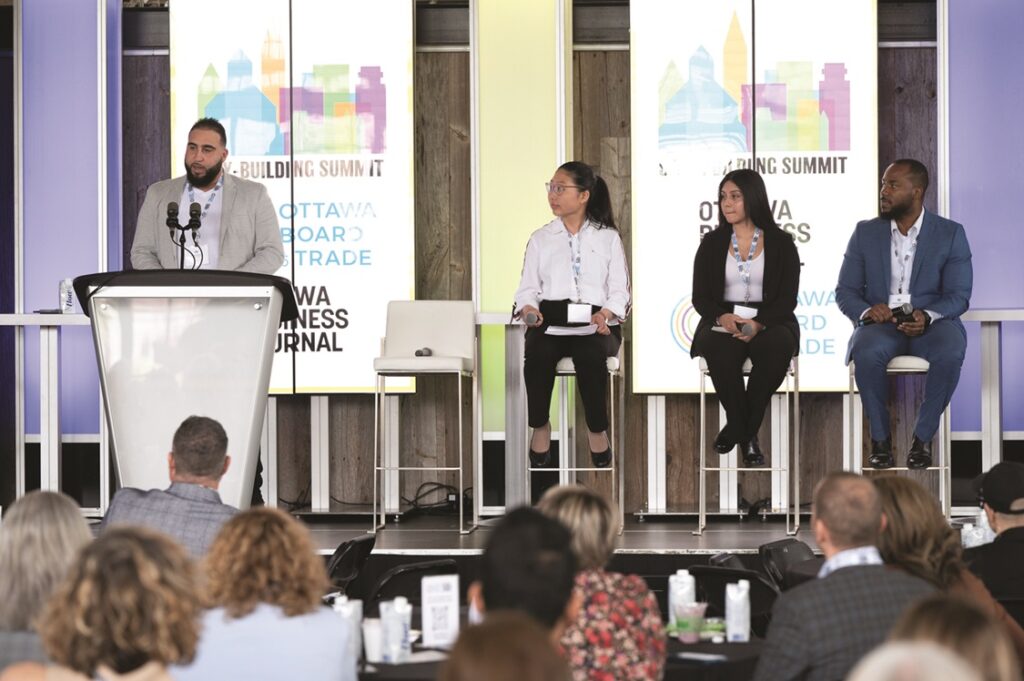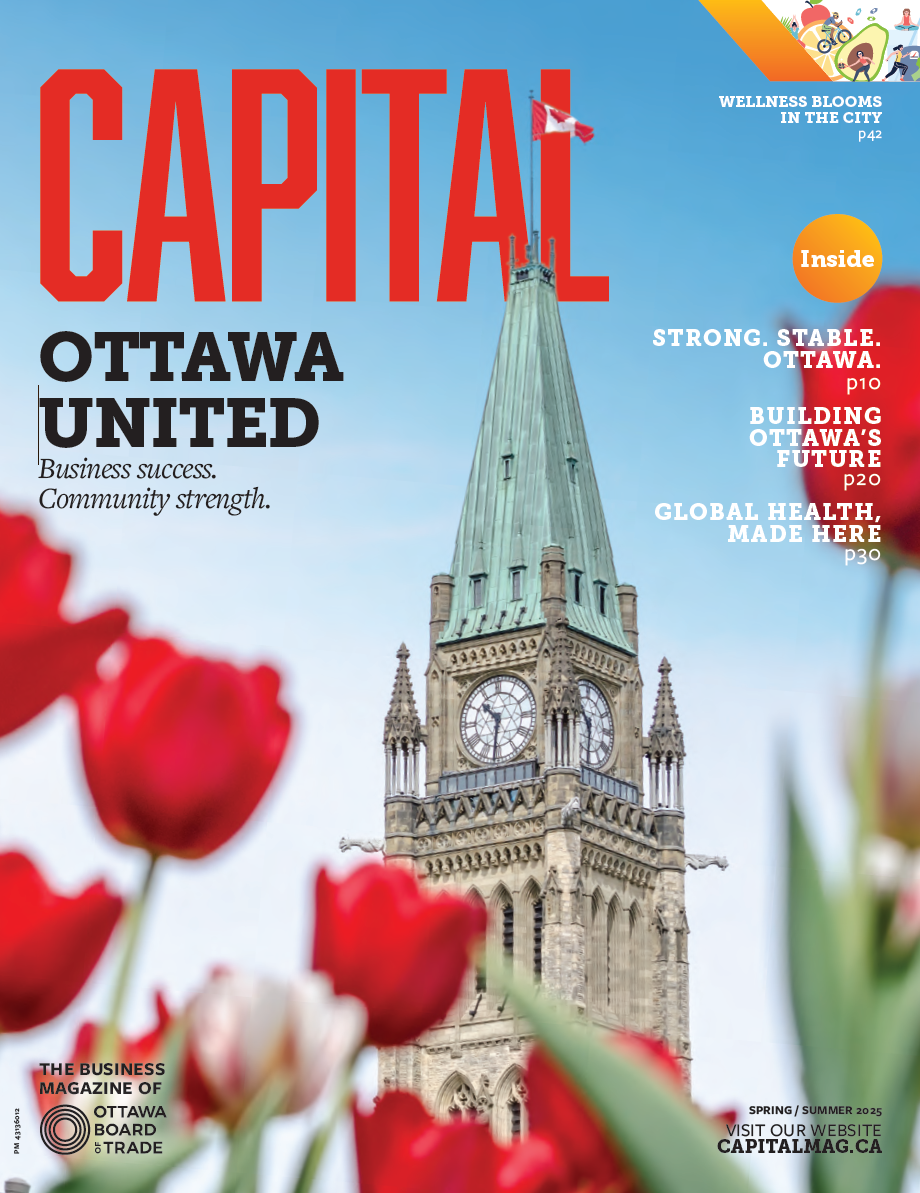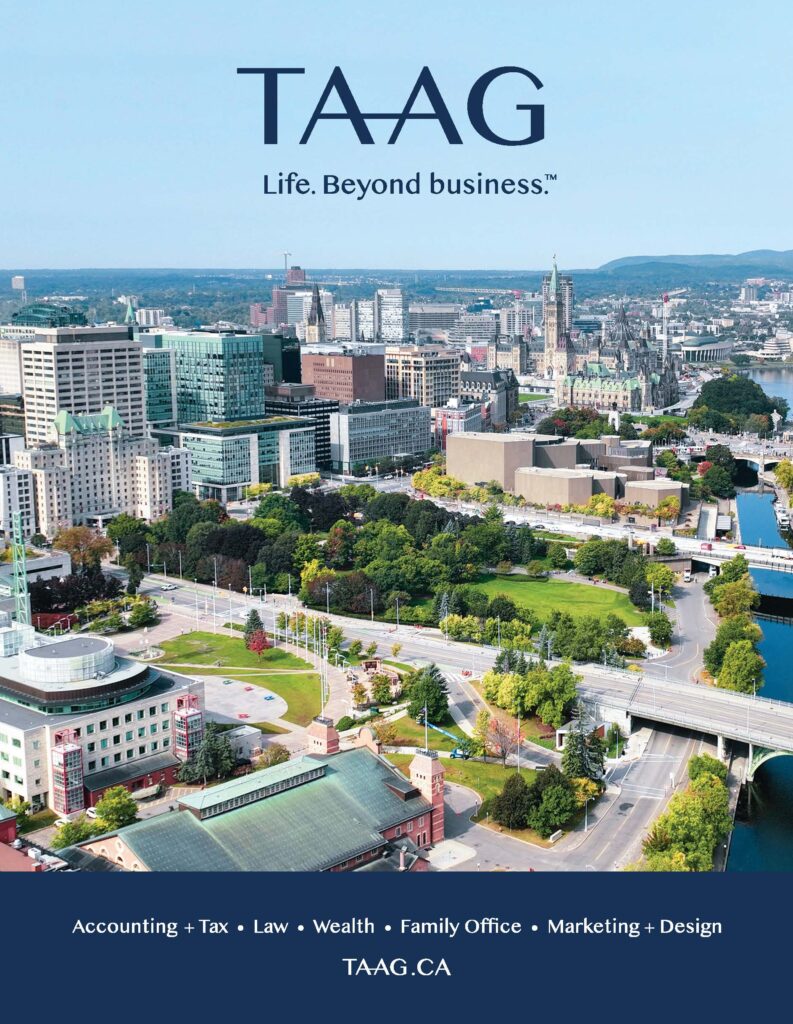Ottawa’s Youth Councillor program taps into the energy and creativity of young people to build a more vibrant city.

“IF YOU’RE TRYING TO ATTRACT 30-year-old workers, make your city a place for two-year-old children.” So said Mike Moffatt, senior director of policy and innovation at the University of Ottawa’s Smart Prosperity Institute when he gave the keynote address at the 2024 Ottawa City Building Summit.
“That is the biggest driver of mobility in Canada right now,” Moffatt said. “Young professional couples are asking, ‘Where can I afford to raise my kids?’ If you have a great city to raise kids, you’re going to have a healthy economy.”
Moffatt’s comments came immediately after a panel called “Young Leaders Lens,” during which a panel of four Ottawa youth councillors—Ottawans who will be looking to raise children here in the future—presented their ideas. Moderator Adam Halawa, community developer and Ottawa Youth Council co-ordinator, had become a father to his second child that very morning.
“The two most common reasons to move from one province to another—the first is going to university or college and the second is graduating from university or college and getting their first job,” Moffatt says. “The bulk of people who leave Ontario—more than half of them—are between the ages of 19 and 32.”

Young Leader Lens Panel at City Building Summit 2024
The youth councillors’ comments on the kinds of things Ottawa could do to make the city more attractive to young people were therefore particularly à propos.
“We want a city where youth are doing amazing things and helping inspire others to do the same,” Halawa said, adding that his panelists were keen to make the world a better place for children and youth.
One project they would like Ottawa to adopt is the UNICEF-led Child Friendly Cities initiative, which aims to give children rights at the local level, using the UN Convention on the Rights of the Child as its foundation. The initiative is also a network that brings together government, civil society organizations, the private sector, academia, the media, and children themselves in this goal of making childfriendly cities.
Asked what’s hampered efforts in Ottawa, Danica Xiao, an undergraduate student studying health sciences at Mc Master University and a youth councillor for the past two years, said the process need to be more collaborative.
“Progress might have been slower in Ottawa as a reflection of the more individualistic mindset where a lot of different stakeholders like government bodies, different organizations and the private and public business community have worked individually towards achieving this goal, rather than adopting a more unified and collaborative approach between different stakeholders,” Xiao said. “This initiative has been on Youth Ottawa’s radar for some time now, but it has become clear it needs to be a more city-wide initiative.”
Xiao said the criteria for becoming a child-friendly city include being a safe, accessible, equal and engaging city, and one that’s easily accessible and navigable for all children.
“This involves addressing issues such as safe pathways, accessible public transportation and infrastructure that accommodates the needs of all children and youth, including those with disabilities,” Xiao said. “Improving sidewalks, bike lanes, and public transit routes can enhance the mobility and independence of youth and children, allowing them to access essential services, recreational facilities, and educational opportunities.”
She added that parks, playgrounds, community centres, and recreational areas where young people can socialize are important, but a lack of good lighting, maintenance, and concerns about safety sometimes deter families from using them.
Further, she said affordable childcare and better mentoring options for older students are both needed, and she suggested establishing more youth councils and youth advisory boards to motivate and empower youth, not only with local government, but also with the businesses that were represented at the summit.
Kerbens Boisette, a graduate of Carleton and founder of Booztbrand Inc., a digital marketing company, told summit attendees about how working with young people allows businesses to tap into their creativity and energy while also ensuring proposed ideas are attractive to their demographic in terms of their aspirations and their needs.
“When we inspire youth as leaders, this really fosters a sense of ownership and responsibility,” Boisette said. “Furthermore, involving youth bridges the gap between generations. It’s really about creating a culture where people feel respected, valued and included in the decision-making process.”
Maria Paula Choque, who emigrated from Colombia two years ago and works at incubator13 after having completed studies in international business management, told the group that there are lots of opportunities in Ottawa outside of the obvious government ones.
“There’s a lot of ideas that that we have that we want to contribute to those projects, so please, let us get involved in a meaningful way,” Choque implored the business leaders who gathered for the summit. “It is not just to say, ‘Oh, yes, we consult with a group of youth,’ [rather, it’s] looking for diversity and representation, [and] understanding the unique needs of youth.”
Youth Ottawa has been operating for 26 years, providing youth across the city with resources, training, and support to build the skills, confidence, and strategies they need to succeed and help build a better community for themselves and their peers. Its programs reach more than 8,000 youth per year.

Ottawa Youth Panel Moderator: Adam Halawa

Ottawa Youth Councillors (from right to left): Kerbens Boisette; Maria Paula
Choque; Danica Xiao
The Youth Councillor program offers its members one workshop and professional development session each month, explained Youth Ottawa executive director Jesse Card in an interview.
“Some of the topics have included professional speaking, community-building, active citizenship and networking,” Card said, adding that they move the sessions to different city-owned facilities each time, and often city councillors will attend as well. The goal is for each city councillor to have a youth councillor who can shadow them and learn about civic engagement first-hand from them.
Other like-minded youth-based organizations in the city include CHEO’s YouthNet, Ottawa Child and Youth Initiative, Rural Ottawa Youth and the Ottawa Police Youth Advisory Committee.

Ottawa Youth Councillor: Kerbens Boisette






















